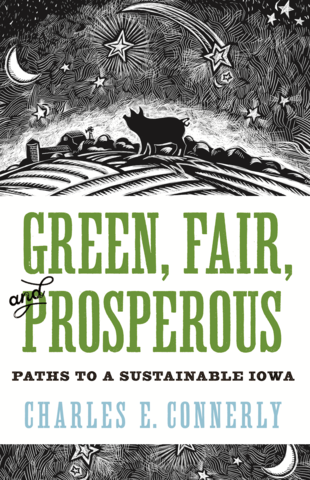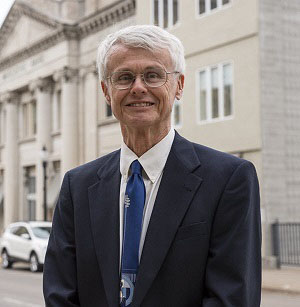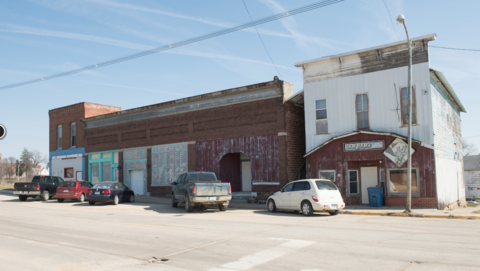
In 1900, Iowa was the tenth largest state in the country. A hundred years later, it was the thirtieth largest and had experienced the biggest decline in its population rank of any state. Today, Iowa is at a crossroads. Its population is more urban, less white, and more environmentally challenged than its longtime reputation suggests. In a new book, Green, Fair, and Prosperous: Paths to a Sustainable Iowa, Charles Connerly provides a thoroughly researched history lesson on how we got here and suggests decisions to make going forward.
“What kind of state does Iowa want to be?” Connerly, the director of the UI School of Planning and Public Affairs, asks in his introduction. To respond to this question, he uses a triangular model of sustainable planning that was developed by University of Michigan professor Scott Campbell. The three points of the triangle are issues that must be equitably addressed: environmental protection, economic growth, and social justice. They are inherently in tension with each other: when one of these issues is “solved,” it often throws the others out of balance; the conundrum is how to do all three well. Connerly is concerned that at this moment, Iowa is not doing any of them particularly well. “Put bluntly,” he writes, “neither the state’s environmental nor its social justice record is exemplary, and Iowa appears to be on a path in which environmental degradation is made justifiable by the health of the economy—or at least the agricultural portion of the economy.”
Culmination of His Iowa Experience

As dire as that sounds, however, anyone who knows Connerly knows that he is far from pessimistic. As the principal founder of the Iowa Initiative for Sustainable Communities (IISC), Connerly is happiest when he is in an Iowa community helping local residents and UI students collaboratively devise solutions to entrenched problems. In Green, Fair, and Prosperous, he brings together many of the lessons garnered from IISC and provides practical ideas and examples for a path forward.
This book is the culmination of Connerly’s career at the University of Iowa. He joined the faculty in 2008 (arriving just after the infamous flood), and the next year he started IISC. Conversations about a book began with the University of Iowa Press in 2014, and Connerly was set to begin writing in early 2015 when he had both a leave from teaching and an Obermann Fellow-in-Residence appointment. But all of that came to a halt when he contracted a life-threatening case of sepsis. In the book’s acknowledgement section, Connerly provides a brief but deep dive into his medical journey, paying deep gratitude to the many healthcare providers and friends who aided him to the state of wellness he enjoys today. It would have been easy for Connerly to turn his back on the project. Instead, he did the opposite.
The physical therapist he worked with at University of Iowa Hospitals and Clinics, Richard Evans, said that during their innumerable sessions together, Connerly spoke frequently about the project: “He is a very motivated and driven man, not only in regards to regaining his functional activities but also in his other ‘bucket list’ activities that included finishing his book.... His wife Martha Ann told the doctors how important it was to get Chuck better because he has a book to write! I sincerely believe that completing this book was one of the driving forces in his recovery. He absolutely did not want to leave it unfinished.”
Connerly was able to postpone both his sabbatical and his Obermann Fellow-in-Residence award to Spring 2016. Each day, he made his way to his second-floor office—something that seemed impossible a year prior. He says that the group of scholars with whom he worked that spring, each bringing his or her work to the bi-weekly seminars that are the hallmark of the Fellows-in-Residence program, were invaluable to crafting the manuscript, as was his editor at the University of Iowa Press, Holly Carver, who encouraged him to create a more accessible and less academically formal work.
Challenging Iowa to Do Better
The book that arrived almost four years later is a love song to Iowa, but one that (as the best loves do) holds the state accountable for past mistakes and challenges it to do better. The book, he says, is an “attempt to look at the state’s past with a historian’s eye and an urban planner’s eye to the future.” A native of Illinois, Connerly attended Grinnell College as an undergraduate. When he returned to the Midwest in 2008, after having spent a considerable portion of his career at the Florida State University in Tallahassee, he had a strong feeling of coming home. Less appealing, though, was Iowa's dearth of diversity.
His first book, The Most Segregated City in America: City Planning and Civil Rights in Birmingham, 1920–1980, unified his interests as a historian and urban planning scholar. In it, he explored the roots of segregation and its contemporary manifestations in one city. As a professor at a university where a substantial number of students are African American, Connerly had enjoyed classroom conversations about race that were rich and multi-faceted, based on students’ personal experiences. In coming to Iowa, he found a campus where it wasn't unusual to have a class entirely comprising White students. “When I’m teaching about issues of race and planning, it can be really hard to have a fruitful dialogue,” he says.
Connerly's longtime interest and dedication to what one might refer to as issues of diversity, ethnicity, and inclusion, is central to Green, Fair, and Prosperous, which contains the chapter “Why Is Iowa So White?” While other chapters look at issues related to Iowa’s past and future that make immediate sense to anyone tangentially aware of the state’s history—water quality and hog confinements, manufacturing jobs and the disappearance of middle-class wages—this focus on social justice is less predictable. But it is absolutely essential to our future, Connerly argues. Convincing local leaders of this is one of Connerly’s missions. Whenever community leaders--usually a combination of elected officials, local government employees, and business leaders--contact IISC with a request to help their town, Connerly says the first item on their minds is usually economic development. As the IISC team shares the three points of sustainable development with them, these same leaders may have an interest and even a keen necessity to think about environmental stewardship; much rarer, however, is an acknowledgement of racial inequality. In fact, says Connerly, when asked about a local non-White population, the response is usually something along the lines of, “Well, there aren’t many here.”
84,000 Immigrant Employees and Counting

Connerly admits that IISC has made the mistake of accepting that answer for too long. Now, however, it is developing a DEI plan to make certain that all members of a community—including potential members—are considered in planning. Pointing to the state’s swing of support for President Barack Obama in two elections to President Donald Trump in 2016 and 2020, Connerly alludes to growing anti-immigration sentiment in rural communities. Although some towns, such as Marshalltown and Postville, welcomed immigrant workers and built relatively positive community relationships between longtime White inhabitants and more recent newcomers, the immigration raids that occurred in the early 2000s soured many Iowans. Connerly warns that an anti-immigrant mindset is not conducive to a positive future for the state.
“Overall, Iowa employs 84,000 immigrants, many of whom work in dairy, hog, poultry, or cattle operations,” he writes. “Consequently, even though many Iowans support Trump’s anti-immigration stance, many others understand that but for immigrants their communities would be a lot worse off. The fact is that the state’s agro-industrial economy depends on the availability of foreign labor, much of which comes from Mexico and Guatemala. In the words of northwest Iowa dairy farmer Darin Dykstra, who milks 3,000 cows three times per day: ‘It’s not a glamorous job. We have 36 Mexican or Guatemalan workers and one American guy. Americans just don’t want to do the work. So if you take away the work force that we have in the United States, now Americans aren’t going to appear magically out of nowhere to do the work....If you’re going to take the labor supply away in agriculture, dairy particularly, it’s going to fall apart. It just will.’”
In the book’s final chapter, Connerly takes aim at a 2018 U.S. News and World Report article that placed Iowa first in a “Best States” ranking. Looking more closely at rankings from various sources on measures such as pollution health risk (38th) and income gap by gender (40th), he deduces that things in Iowa are not all that rosy. Rather than end on a sour note, however, Connerly—just as he did with his own health predicament—asks a) what is possible? and b) how do we get there? He provides a list of twelve general principles derived from the sustainability triangle.
The list and the well-researched analysis of each item on it should be necessary reading for all Iowa politicians and policymakers. It makes recommendations for raising the minimum wage, which at $7.25 is among the lowest in the nation, and for addressing the state’s poor water quality. Doing so would be good for Iowans' health and also drastically benefit the Mississippi River/Gulf of Mexico Watershed. Last on the list—holding not the “least” spot but rather serving as an exclamation point—is Connerly’s insistence that Iowa become a state that welcomes diversity.
A Proponent of Publicly Engaged Research and Teaching
When asked about the role of the state’s three public universities in approaching these issues, Connerly is not shy of ideas. He sees possibility for extending research and teaching into communities of every size. From placing graduate students in internships in Des Moines to bringing book artists to tiny towns, Connerly is a believer in the benefits of publicly engaged research and teaching for faculty, students, and Iowans.

Since arriving at the UI campus twelve years ago, Connerly has been active in nearly every segment of publicly engaged research and teaching. IISC works with specific Iowa communities to discern and address issues that are then worked on and often actualized by students in both the School of Planning and Public Affairs and from other departments. A recent example of their work was a project with the tiny town of Delmar, population 525, in which children from the local elementary school interviewed older residents about the town’s history. [The single block of Delmar's business district is pictured in this photo by Tim Schoon.] Using oral history techniques and working with faculty from the UI's Center for the Book, the children created fifteen videos from the interviews, as well as a series of handmade books in which the young Delmar residents made suggestions for the future of their town. One student suggested a splash pad, which excited town leaders so much that they raised funds and constructed this much-needed space for play and community connection. In 2011, Connerly was part of the Faculty Engagement Corps, which traveled across Iowa, visiting towns of every size and listening to the concerns of people from towns like Goodell that needed a wastewater treatment plant, the cost for which far exceeded its means. That trip included Craig Just (Civil and Environmental Engineering) and Barbara Eckstein (English), who, along with Connerly, have been co-directors of the Obermann Graduate Institute on Engagement and the Academy.
Connerly recently handed the reigns of IISC to School of Planning and Public Affairs faculty member Travis Kraus, but he remains involved in its work and in working toward his book's recommendations for Iowa. Connerly is now beginning a biography of former Iowa Governor and Senator Harold Hughes, who was a force for progressive change in the state as well as in the nation. Along with Kraus and Loyce Arthur and Mark Bruckner of the Department of Theatre Arts, he is teaching a Spring 2021 Theater Planning and Public Affairs course that will build upon the creation of a Black Lives Matter mural in downtown Iowa City. The class will feature a community project using arts and culture to promote Black advancement, economic inclusion, and community cohesion in Iowa City.
It is not surprising that Connerly, having survived sepsis and finishing a book that many might consider a closing opus, is continuing to contribute to the state he loves and to the field he has led (in 2018 he won the Jay Chatterjee Distinguished Service Award from the Association of Collegiate Schools of Planning), vigorously moving forward with new projects. Kraus says of his longtime mentor, "Chuck is a champion for the small rural communities of Iowa, continually reminding us all of the unique stories of these places and what they can offer to future, increasingly diverse Iowans. His vision for the Iowa Initiative for Sustainable Communities more than ten years ago has manifested as tremendous projects all across the state and has jump-started the careers of hundreds of University of Iowa graduates. His largely unseen contributions to the state, through his commitment to community engagement and his mentorship to students, will reap benefits across Iowa for many years to come."
Watch Connerly and Lucie Laurian talk about the effects of COVID-19 on cities.